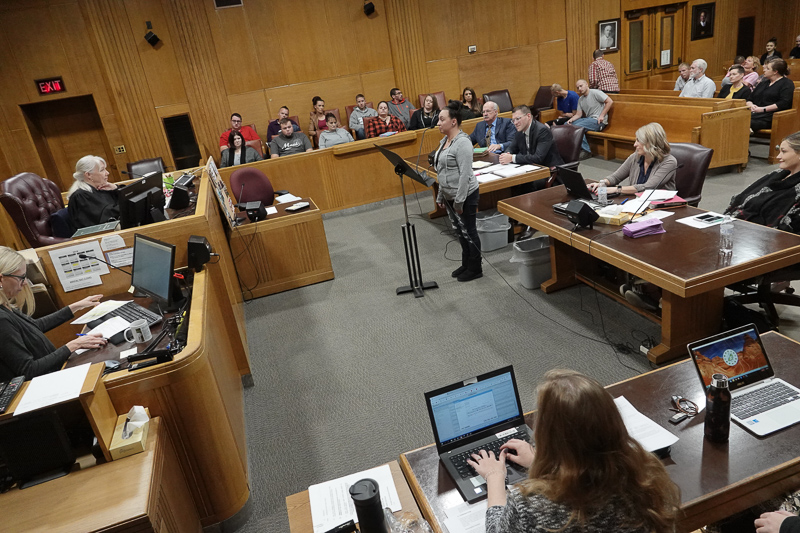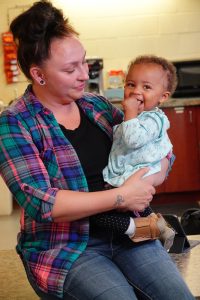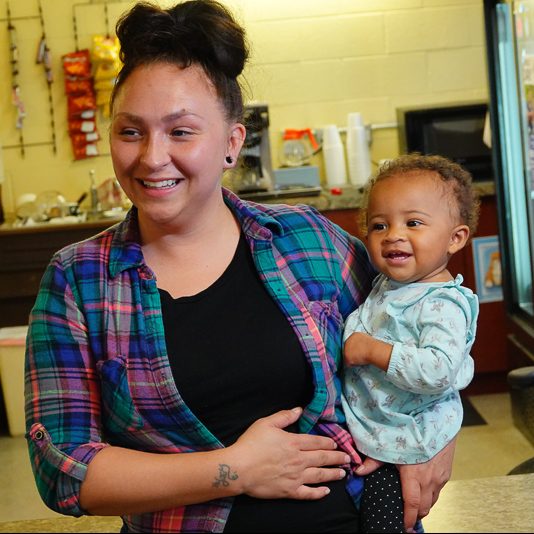Lacy
by Jelissa Burns

Lacy steps up to the lectern in the middle of the stuffy courtroom, her drug court peers watching her as she hands over her paperwork.
“How are your test results?” the presiding judge asks. “Clean,” Lacy responds, her peers fill the room with applause. This is not the first or the last time she will answer that question. Lacy has been attending drug court since 2017, working on her recovery from addiction. Behind her, in the pews, her one-year-old daughter, shrieks in joy and excitement as friends and family take turns holding her. The judge asks Lacy what she’s doing to work on her recovery this week.
“I did a lot of self-care,” she answers. “I visited my family, I talked to my therapist about it. I still see my AODA counselor about it.”
Lacy is a young mother of three daughters who has struggled with addiction since she was a teen. Born in Shawano, Wis., to an addicted, alcoholic, abusive father and a mother who left her husband and relocated with Lacy, 2, to Oshkosh.
It wasn’t until middle school, however, that Lacy started getting in trouble with the law. Her mother, who had remarried and divorced her second husband, then turned to alcohol.
“My mom started drinking pretty heavily and wasn’t around very much. When she was, I was put into a caretaking role for my mom,” Lacy said. “I took care of my drunk mom, and I think that sort of catapulted me into getting really deep into drugs and alcohol and hanging out with people who were older than me, older men and promiscuity.”
At 14, Lacy went to her first treatment center due to her behavior and addiction, but it certainly was not her last.
“I have a rap sheet that goes back so far. I started running away from home, skipping school, and stealing alcohol bottles from stores when I was 14,” she said. “I was on supervision as a juvenile, which is like probation, from the time I was 14 to the time I was 17 only because I aged out.”
High school proved to be even more of a challenge for her. She felt different from her peers and uncomfortable in her own skin, so it was hard for her to make and keep friends. Before the end of her freshman year, Lacy had dropped out of high school.
In her free time, she found herself in jail or shelters. She was hanging around the wrong crowd, smoking weed and taking pills. When she was only 16, she followed her then-boyfriend to Florida without her mother’s permission. While in Florida she turned 17 and got her GED and driver’s license, but her fun was short-lived.
“I was underaged and my parents found out where I was,” she said.
Lacy was brought back to Wisconsin.
“That’s when I got put into inpatient therapy as a last-ditch effort by my parents,” she said.
After she was released from inpatient therapy, Lacy, however, continued to be active in her addiction. Treatments and therapy were only a temporary fix to a long-term problem.
“The warm, fuzzy safe feeling”
At the age of 21, Lacy had her first daughter. Although she was still actively using drugs, she was working on trying to provide a good life for her and her daughter.
“That’s where I have a few years of, definitely not sobriety, but responsibility,” she said. “I got my certifications so that I could better support her and I worked as a nurse aide. I did really well at work, I progressed, I got into better positions there. Things were going good for me.”
Although Lacy was actively using drugs, she was still able to keep her job and even get promotions. But when Lacy broke her foot and developed a kidney infection in the span of three months, she was prescribed Vicodin which catapulted into her addiction to opioids.
“This was the good feeling I was searching for, the warm, fuzzy, safe feeling,” she said. “I had this thing that was my best friend, my boyfriend, all that stuff that people say that it was. Slowly, I stopped caring about everything else. Within a year I was doing handfuls of pills, it got very expensive.” She spent $200-$300 day to get her high.
She attempted to continue working while still active in her addiction to pills, but the addiction began to take over her life. Within a month of getting an important promotion, Lacy quit her job.
“I was starting to get dope sick and sometimes I couldn’t get my drugs so I wasn’t going to get up and go to work. I couldn’t do that,” she said.
Around this time, Lacy had also gotten into a relationship with a drug dealer, who kept a tight rein on her life. He would not let her buy drugs from anyone else, in an attempt to stop her from speaking to other men. He wanted to be the only way she had access to drugs and he was successful. However when he was arrested for selling crack, Lacy found herself cut from her much-needed drugs. Soon, Lacy resorted to selling heroin for money and found herself quickly addicted to the potent drug. For four years, heroin became her drug of choice. “That, really, is the drug that took everything,” she said. “I lost everything, even my own identity. I still had my first daughter, but I wasn’t a very good mother to her. She was with other people a lot.”
Lacy broke up with her drug dealing boyfriend and moved in with her daughter’s father. However, it wasn’t the last time she heard from her ex. “He called me — we used heroin together in the past — and he asked if I could get him some,” she said. “I said my dealer could, I couldn’t. I introduced them, he gave me a ride over there and we both bought heroin. He dropped me off at my daughter’s father’s house, and he went home and that was the last time I saw him. He went home and he overdosed and died. I don’t know how I handled it then, I just kept using. I couldn’t stop.”
The guilt and pain of his passing fueled Lacy’s addiction.
“The time between him dying and me getting arrested for that is like the darkest time of my life,” she said. “I didn’t care about myself. I had shot heroin trying to kill myself, hoping I wouldn’t wake up. I didn’t want to live anymore after he died. I just felt like the scum of the earth, and I didn’t know how to deal with the feelings from that and my part in it. I wasn’t living.”
“When you don’t have the help to stop”

Lacy with her three daughters. (Family photos provided by Lacy)
months after the death of her ex, Lacy was charged with drug offenses. Instead of turning herself in, she went on the run. She found herself in different parts of the country doing what she could to score drugs and survive. During this time she became pregnant with her second daughter. Lacy had managed to stay sober for almost the entirety of her pregnancy, right up until the ninth month. She relapsed on heroin during the last month of her pregnancy.
“I could have killed us both,” Lacy said. “I just did countless things to my unborn baby that she didn’t ask for and didn’t deserve. It had nothing to do with whether or not I loved my baby. It’s the insanity of that situation and being addicted, having a big belly and looking down and just not being able to stop is a testament to the powerlessness of when you’re addicted to something and you don’t have the help to stop.”
Immediately after giving birth, Lacy was taken from the hospital to jail due to her warrant and was held for 60 days before release. After being released, she was back on the streets using drugs and selling her body. “I knew I was going to prison, and rightly so, but I was scared,” she said. “I cared so little about myself. I was less scared about going to prison and more scared about having to stop getting high and live without drugs. It’s scary, especially when you’re addicted to opiates and you know you’re gonna get dope sick.”
In April of 2015, Lacy was convicted of heroin charges and sentenced to four years in prison and four years extended supervision. However, Lacy successfully completed an Early Release Program in prison and was released after two years.
“It’s like a really intense treatment program for drugs and alcohol, and if you complete the program you get almost half your time taken off of being in prison,” she said. “I did this program, I didn’t just do it to get out. That was the case at first, but once I started doing it I really felt good about myself and wanted to stay sober and wanted to live a life without drugs and alcohol and really be a mother.”
While in prison, Lacy was prescribed Vivitrol, an injection medication that is used to block the effects of opiates. But after she was released, she found it hard to live in the real world. She had been an addict since she was a teen and it was all she had known for so long. It was difficult for her to hold the responsibilities that the average adult has.
“A lot of people I know that got on Vivitrol went from being opiate addicts to doing meth,” she said. “I think it works for someone who’s working a program and I wasn’t. If you just go get a shot of Vivitrol, and you’re an addict like me, that’s not going to be enough to keep you sober.”
Without a program and a solid support team, sobriety seemed more like a myth than a reality for Lacy. While others were learning how to find and hold jobs, pay bills and balance their checkbook, Lacy was running from the law, hustling and using. Three days after being released from prison, Lacy relapsed.
Because the Vivitrol prevented her from getting high on opiates, her addiction switched from heroin to meth. Soon, she was showing up high to family holiday gatherings, burning bridges with close friends and hanging with dangerous crowds. Yet, a new beginning was in store for her, she just had to weather the storm first.
“People were worried about me”

Lacy in 2017 right before she entered into the drug court program.
2017, Lacy’s addiction to meth was starting to affect her mentality. After a week-long bender that she spent with an ex-boyfriend, she returned home, where she had a mental breakdown and attempted suicide.
“I was just hearing voices and they were all telling me that I should do this,” she said. “I had all these paranoid thoughts, I had been up for weeks, and I felt like everyone in my life had turned on me. I took a bottle of pills and I wanted to go to sleep, but I couldn’t because I was having all these auditory hallucinations. I called my stepdad and he took me to the hospital and I got my stomach pumped.”
Due to the fragility of her health, Lacy was sent to a mental hospital where they wanted to keep her until she was deemed mentally healthy enough to be released. In an attempt to be released from the hospital, Lacy alerted the hospital that she had a warrant out in her name. It worked, and she was transported to the local jail. While there, she found out she was pregnant with her third daughter. After being released from jail, she began staying at Nova Counseling Services, Inc. in Oshkosh, Wis., and was also ordered to complete Winnebago County Drug Court.
“People were worried about me,” she said. “I didn’t catch any new charges like most people do, it wasn’t because I had my back against the wall, it’s because people were saying, ‘she can’t stay sober.’”

Lacy and her friend, Stephanie, in December 2019.
Through drug court, Lacy was able to find a support group that could teach her how to live in society sober.
“I had never been taught how to live my life without drugs and alcohol, and I was the type of person that couldn’t do it without a ton of support and accountability,” she said. “And that’s what drug court gave me. Looking back, that’s exactly what I needed and I’m glad it exists for people like me. Drug court taught me recovery, but it also held me accountable and, for once, the consequences started to matter to me, because all of the work that I was doing there, I was receiving so many gifts back into my life. Relationships with my daughters, my parents, my family. Before, it never really bothered me because I didn’t care about myself or anybody else.”
Drug court gave Lacy the fresh start that she so desperately wanted. She’s been in the program since 2017, and although she faced a few setbacks, she has been progressing. Not only has the program taught her how to live in the real world while being sober, but it gave her the motivation to be ambitious and do things she never imagined.
“The consequences aren’t what keep me sober now, I’ve had the support so long that this is just how I live my life,” she said. “It’s important for addicts to make it a lifestyle.”
“I’m happy”
At the New Moon Cafe in downtown Oshkosh, Lacy looks healthy and content. It was almost impossible to believe that at the peak of her addiction she was underweight and looked sickly. Lacy’s best friend of eight years, Stephanie, said the difference in Lacy from eight years ago to now is almost unbelievable.
“The first time I met her, I didn’t even know her at the time, but she swallowed 28 Vicodins in front of me,” she said. “Fourteen in one hand and 14 in the other. I left because I was afraid she was going to die.”
The pair had met through Lacy’s ex-boyfriend who attempted to pit them against each other, but instead they built a strong friendship. Stephanie details how they’ve been through hell and back with each other, from partying to going to jail.
“She cares more now,” Stephanie said. “Even when she slips up she’ll feel remorseful about it. When she was heavily addicted, she just couldn’t care if she hurt you. She’s more dependable and I get to see her more now.”
Stephanie said that no matter what she’ll be by Lacy’s side, only wanting the best for her.
“I just hope that she can find happiness in being sober,” Stephanie said.
 It seems like Lacy has indeed found happiness. She smiles as she talks about her new job and her future plans to gain full custody of her middle daughter, who lives with her mother and step-father. She has her youngest, a smiley 1-year-old who can walk, but likes to be carried, full time, and she has her oldest daughter, 11, two weekends a month, holidays and half the summer. Lacy’s serious demeanor changes when she talks about her children. Her body relaxes. Her smiles widen. “I am doing all this for them and for me,” she said.
It seems like Lacy has indeed found happiness. She smiles as she talks about her new job and her future plans to gain full custody of her middle daughter, who lives with her mother and step-father. She has her youngest, a smiley 1-year-old who can walk, but likes to be carried, full time, and she has her oldest daughter, 11, two weekends a month, holidays and half the summer. Lacy’s serious demeanor changes when she talks about her children. Her body relaxes. Her smiles widen. “I am doing all this for them and for me,” she said.
In December 2109, she moved into phase four of drug court, which allows her more freedom with her life and decisions. She is signing a lease for a two-bedroom apartment, complete with beds for her older daughters. She plans to move in March 1 of 2020. “This is the first place that is all mine,” she said, with great pride. “I don’t have to rely on my parents, or a man. I did all the work I’m sober, I’m happy, and I’m really enjoying being a mother.”

